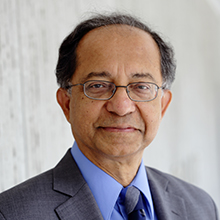
Keep politics out of the inflation debate

By Kaushik Basu.*
Ithaca – Until a few months ago, talk of inflation was little more than a murmur; – dry data from the statistical office, reports tucked away in the newspaper, and an occasional commentary. Now the discussion is urgent and anxious, as news of rising price levels comes in from economies around the world, including Argentina, Brazil, Turkey, India, and, most important, the United States.
The surge in inflation in the US, the world’s largest economy, is causing the greatest concern because its spillover effects are invariably far-reaching. The trouble is that – in a debate bookended by Paul Krugman and Olivier Blanchard – no one fully understands what is happening. Krugman thinks the current inflationary pressure is a short-term episode triggered by supply-chain disruptions, while Blanchard sees it as the result of the large spending under President Joe Biden’s American Rescue Plan, and as a prelude to a longer battle.
Unlike Krugman, I believe that rising US inflation, currently at a 30-year high of 6.2%, is caused by this big spending package. But I also believe, contrary to Blanchard, that Biden’s policy intervention was right, and that higher inflation is a price worth paying for the benefits the rescue plan has brought, particularly to the most vulnerable Americans.
This relief is reflected in the latest US data. During three months preceding September, the US saw higher wage increases than any time in the last 20 years. Workers have gained a stronger bargaining position, and have even stayed away from the labor market when their wage demands have been unmet.
To be sure, US policymakers will have to navigate some difficult terrain ahead, because the COVID-19 crisis has left many open wounds. A recent University of Michigan survey found that one-quarter of Americans expect their financial situation to worsen in the near term, a level of pessimism not seen since the Great Recession of 2008-09. All this is cause for global worry, because a US slowdown with elevated inflation will have adverse effects worldwide.
The US Federal Reserve will likely have to raise interest rates more substantially than it is currently indicating (which no doubt reflects a desire to discourage speculative dollar appreciation). But the US has expertise enough to pull out of this inflationary period, and its monetary and fiscal policies are broadly on the right track.
Other important economies, such as Turkey and Brazil, face a direr situation. Turkey currently has an alarming annual inflation rate of 19.9%. Making matters worse, President Recep Tayyip Erdoğan has strong (and wrong) views about how to control inflation. He believes the right response is to reduce interest rates. This can very occasionally be the right policy, such as when there is a lot of carry trade. But it is not the correct response now. It is thus not surprising that the Turkish lira has been losing value sharply, prompting some to warn of a currency meltdown.
Brazil has recently joined the list of countries with double-digit price growth, with annual retail inflation of 10.7% causing huge hardship for the poor. Moreover, inept policymaking by President Jair Bolsonaro’s government – the Economist recently criticized its “fiscal incontinence” – has stoked fears that the economy is on the verge of a technical recession.
Unlike in many previous global inflationary episodes, what is remarkable this time is how different the cross-country experiences have been. The reason is probably that, while the current inflationary trends have a common cause, namely, the rebound from the pandemic-induced slowdown, countries’ diverse responses to this novel crisis have led to varied economic performance.
India, for example, faces an especially tricky inflation problem. Retail inflation is elevated but not at the level seen in many other economies. It rose to 4.5% in October, up slightly from 4.4% in September, and has been hovering around this range for several months. But wholesale price inflation, which increased sharply to 12.5% year on year in October, from 10.7% in the previous month, is getting out of hand and has reached its highest levels since the late 1990s.
This poses an unusual policy challenge. The wide divergence between wholesale and retail inflation is evidently squeezing small manufacturers, the self-employed, and workers. Those who buy from the wholesale market and sell on the retail market are seeing their profits tumble. They are cutting back on production and this, in turn, is adversely affecting workers.
If the government allows this divergence to persist on the grounds that consumers are not being badly hit, growth will likely decline as small businesses, already under strain, reduce output and cut employment – and possibly shut down. On the other hand, if the government tries to narrow the gap by letting retail inflation rise, consumers will be hit hard. Given that India was among the world’s worst-affected economies during the pandemic and is only now beginning to recover, this would be a huge setback for many citizens.
The only reasonable way out is for policymakers to tackle wholesale price inflation directly. This will require a combination of fiscal and monetary measures, like reducing the high tax on fuel that helps to fund government expenditures and slashing all non-essential spending (while supporting those hit hardest by the pandemic). It may also be time for the Reserve Bank of India to consider hiking interest rates.
Inflation management is no easy task. We do not fully understand the links between the world of money and liquidity, on one hand, and that of goods and services on the other. Policymakers must therefore rely on a combination of science – based on the regularities observed in the vast amounts of data available to central banks and treasuries – and judgement. But there is one thing we do know: politics must be kept out of it.
* Kaushik Basu, a former chief economist of the World Bank and chief economic adviser to the Government of India, is Professor of Economics at Cornell University and a non-resident senior fellow at the Brookings Institution.
Copyright: Project Syndicate, 2021.











































